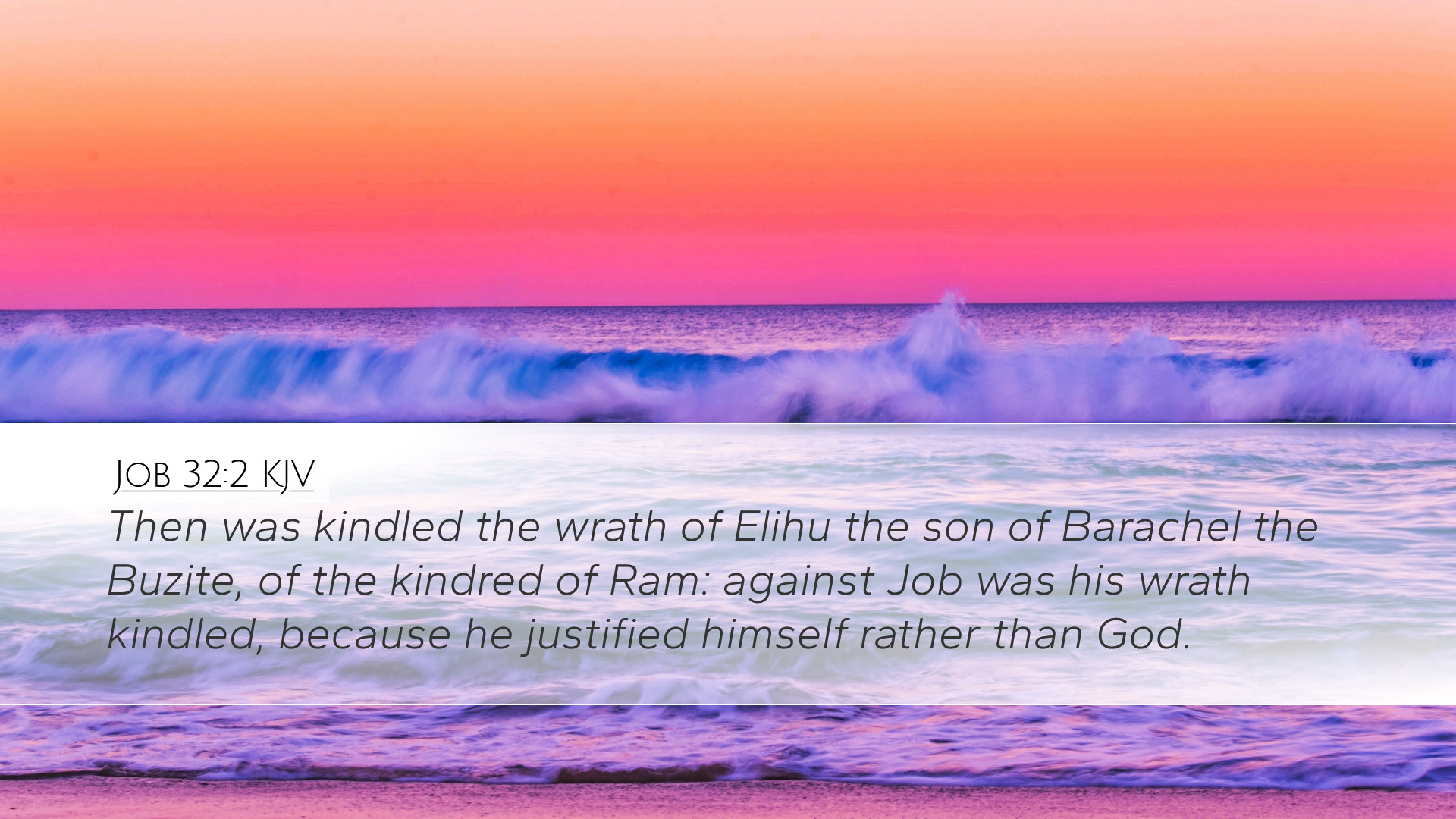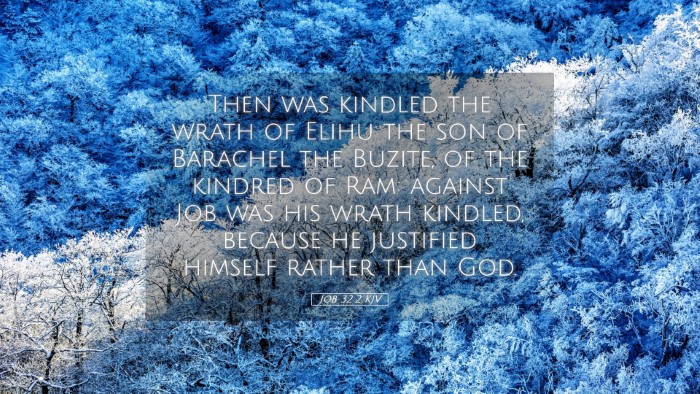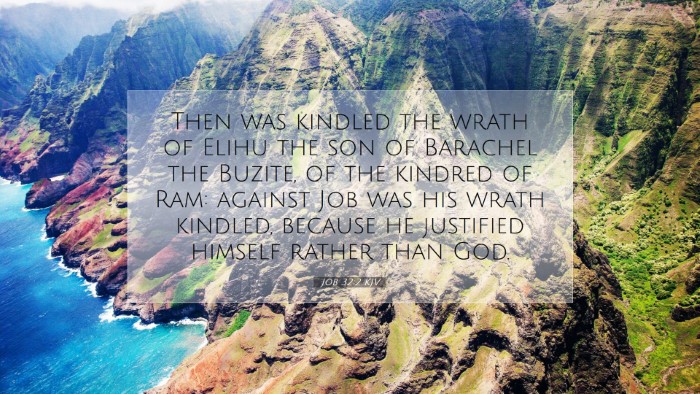Old Testament
Genesis Exodus Leviticus Numbers Deuteronomy Joshua Judges Ruth 1 Samuel 2 Samuel 1 Kings 2 Kings 1 Chronicles 2 Chronicles Ezra Nehemiah Esther Job Psalms Proverbs Ecclesiastes Song of Solomon Isaiah Jeremiah Lamentations Ezekiel Daniel Hosea Joel Amos Obadiah Jonah Micah Nahum Habakkuk Zephaniah Haggai Zechariah MalachiJob 32:2
Job 32:2 KJV
Then was kindled the wrath of Elihu the son of Barachel the Buzite, of the kindred of Ram: against Job was his wrath kindled, because he justified himself rather than God.
Job 32:2 Bible Commentary
Commentary on Job 32:2
Verse Reference: Job 32:2 - "Then was kindled the wrath of Elihu the son of Barachel the Buzite, of the kindred of Ram: against Job was his wrath kindled, because he justified himself rather than God."
Contextual Background
The book of Job presents a profound inquiry into the nature of suffering and divine justice. Within this dialogue, numerous characters engage in discussions around God's justice, human wickedness, and the plight of the righteous. Elihu emerges relatively late in the discussion, providing a fresh voice among the other friends of Job and posing significant theological insights.
Elihu's Character and Role
Elihu, described as the son of Barachel the Buzite, embodies youthful zeal and is characterized by his anger towards Job and his friends. He is unique in the narrative as he represents a different perspective from the three comforters - Eliphaz, Bildad, and Zophar. While the older friends emphasize retributive justice, Elihu introduces the notion of God's sovereignty and the necessity of humility in human understanding.
Insights from Matthew Henry
Matthew Henry notes that Elihu's anger arises from Job’s self-justification and the friends’ failure to provide adequate answers. Henry posits that Elihu perceives Job's defense of his righteousness as undermining the righteousness of God. Henry emphasizes the importance of humility before God, suggesting that Elihu serves to remind both Job and his friends of the limitations of human wisdom.
Albert Barnes' Perspective
Albert Barnes interprets Elihu's wrath as justified, given the context of the dialogues. Barnes contends that Elihu's approach is more fitting as he seeks to direct attention back to God’s righteousness rather than human merit. He highlights that Elihu’s intention is not merely to critique but to enlighten, urging the characters (and by extension, the readers) to seek understanding through God’s perspective.
Adam Clarke's Commentary
Adam Clarke elaborates on the specific identities within the narrative and their relevance. Clarke points out that Elihu's familial background as a Buzite connects to the lineage of Abraham. He emphasizes Elihu's youthfulness, which serves as a reminder that wisdom isn’t bound by age. Clarke describes this moment as a pivotal shift in the conversation where Elihu’s insights could serve as a bridge towards understanding divine justice.
Theological Implications
In Job 32:2, Elihu's anger serves as a theological pivot in the text. The verse unveils the importance of recognizing God's position as sovereign above any human understanding or rationale regarding suffering and justice. As viewers of the trial of faith displayed by Job, both the friends and the audience are invited to reconsider their perspectives on divine justice.
Self-Justification vs. Divine Justice
Job's defense of his righteousness often clashes with the expectation of divine retribution. This presents a profound theological challenge: How does one understand God's justice in the face of undeserved suffering? Elihu's stance is that self-justification is a delusion that distances individuals from God’s will and understanding.
The Centrality of God's Wisdom
The emphasis Elihu places on God's omnipotence is crucial. He underscores that divine wisdom transcends human capability. This verse calls theological students and scholars to critically engage with their understanding of God's workings in the world and to scrutinize their interpretations of justice and righteousness.
Application for Pastors and Theologians
In the contemporary context, Elihu's words resonate with the church's need to address genuine questions about suffering and divine justice. Pastors are urged to lead congregations in humility, inviting them to trust in God’s plan rather than clinging to a surface-level understanding of fairness. The discourse Elihu introduces sets a tone for pastoral care that seeks to balance empathy with a call to greater understanding of God’s nature.
- Humility: Encouraging a posture of reverence before God's wisdom.
- Openness to God's Sovereignty: Allowing space for God’s plans which may defy human logic.
- Engagement with Suffering: Providing resources and teachings that align with Job's exploration of pain.
Conclusion
Job 32:2 encapsulates a critical turning point within the text, portraying Elihu's condemnation of self-justification and calling for acknowledgment of God's righteousness. By integrating insights from Henry, Barnes, and Clarke, we find a rich tapestry of understanding regarding Elihu's role, offering meaningful applications for pastoral practice and deeper theological reflection. Elihu's voice resonates today, advocating righteousness, humility, and an unwavering reliance on divine wisdom amidst suffering.


